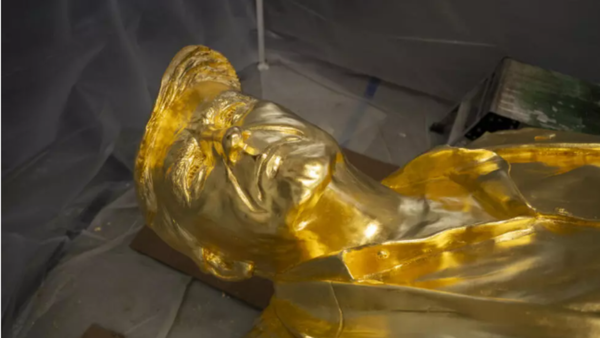
Prime Minister Prayut Chan-o-cha insists he would not want to be part of a minority government after the May 14 election, despite this being possible under the constitution.
In an exclusive interview with the Bangkok Post, Gen Prayut, who is also the United Thai Nation (UTN) Party's chief strategist and No.1 prime ministerial candidate, said the formation of the next government will depend on the negotiations between parties prompted by the ballots cast.
"It is up to the parties to hold talks when they know how many seats they have got," he said.
"The constitution doesn't prohibit any party that fails to gain a majority of seats [from forming a government]. But that's not my preference. I would like my party to win the most seats," he added.
The charter also allows for a prime minister to be picked from a non-winning party.
"I don't want to say now which party is likely to secure more seats. We'll have to (wait and) look at the numbers.
"If we can win enough seats, but we don't get nominated, then we'll just follow the rules. Everyone wants to be the prime minister. But whoever is chosen must do the job to the best of their ability,'' Gen Prayut noted.
Asked for his thoughts on several recent opinion polls that show the UTN is trailing rivals such as Pheu Thai, he dismissed these as unreliable indicators.
"I believe every party has conducted their own opinion polls in such a way that produces favourable results for themselves. Today's results are good, but they may not be so good tomorrow. There are ups and downs," he said.
"But I believe the UTN will capture enough seats to form a government. We have set our target," he said, adding that whenever the party rolls out a new policy, its popularity goes up.
The prime minister said he believes voters are prone to frequent changes of heart and mind, with opinion polls now suggesting that over 30% of voters remain undecided about which party they will choose.
Gen Prayut said his popularity remains high because people recognise his achievements and contributions to the country.
Asked whether the UTN would enter into an alliance with the Palang Pracharath Party (PPRP) led by Deputy Prime Minister Prawit Wongsuwon after the election, Gen Prayut was noncommittal.
"Everything is possible. But we would also have to look at the number of votes gained and other conditions," he said.
"If anyone acts for the sake of the country, [their] religion and the monarchy, I'm ready to [work with] them. But if it is otherwise, that wouldn't be acceptable."
Commenting on the poll results showing parties in the coalition government having lower scores than those in the opposition bloc, he said: "It's not certain that our side has a lower score. Several coalition parties have told me the results of the opinion polls can vary a lot."
"We give moral support and encouragement to each other. We should not be in conflict. We must trust each other," he said.
Gen Prayut said he disagreed with populist policies involving cash handouts as these will have to be financed by taxpayers.
"We are still using a deficit budget system. Many people still haven't entered the tax system, even though they should have. They won't have to pay taxes if they earn less than the minimum threshold," he noted.
"There are about 10 million people in the tax system, but only four million of them pay taxes, not to mention all the tax deductions. So we have to use the money from four million people to take care of the whole nation, as well as running regional and local civil service systems.
"Is it possible to run the country when we can only collect this amount of revenue? We have to decentralise power and allocate money to the provinces, which have smaller budgets," the prime minister said.
"We have to develop these areas. But it's wrong to borrow money just to give it away [in the form of handouts]. That would hurt our credibility."
During Covid-19, it was necessary for the government to take out loans to help vulnerable groups, but this was only a short-term measure, he said.
"Today, we need to make optimal use of the money at our disposal. We need to maintain monetary and fiscal discipline in a vigorous manner," the prime minister added.
"Our economy is larger than those of many countries. We just need to improve the quality of the products we make.
"We have to find ways to help farmers who invest a lot but receive little profit. We need to devise plans to promote organic farming and change farmers into 'smart' farmers.
"Farmers should be encouraged to grow other crops, not just rice. For example, farmers in the North are now growing lavender for commercial use to make extracts of essential oils.
"Growing lavender on one rai of land for three years can yield a profit of hundreds of thousands of baht," Gen Prayut added.
"We have to look for technologies to add value to our products. We will move from being a middle-income country to a high-income one. We have to achieve this goal, even though it may take some time. But right now, Thai farmers are already growing much stronger.
"I can say things will improve. We will change everything for the better in a stable manner. Change must be gradual, not drastic, not the kind of rapid change that will lead to conflict.
"Today, I am ready to follow through with my work to ensure continuity with what has already been done. The opportunity to stay on for two more years [as prime minister] is not a limitation or a weakness. I can still make changes with the collaboration of people of all ages," he said.
Gen Prayut was referring to his eight-year limit as prime minister, which will expire in 2025.
The Constitutional Court last year ruled that his tenure started on April 6, 2017, when the current charter was promulgated.
Under the ruling, if he were to be re-elected by a joint sitting of parliament after May 14, Gen Prayut would only be eligible to remain in office until that deadline.
Commenting on how some parties are seeking to replace military conscription with voluntary recruitment, he said conscription must be retained in the interests of national defence.
However, the rules have been revised so that conscripts now only have to fill two-thirds of the total demand, he said.
Gen Prayut said people could voluntarily apply for 12-18 months of military service while anyone who has undergone territorial defence training, or Ror Dor, can also be exempt from the draft.
"Conscription is compulsory in those areas where military personnel are understaffed. The constitution stipulates that Thai men are bound by duty to serve in the military.
"The current situation may be relatively peaceful but don't think a war will never break out," he said. "The geopolitical landscape is changing quickly. How do you know we won't be involved in a war?"
"We have to deploy forces around the country. We share about 3,000 kilometres of border with a country to our west. Some people say we have so many troops, but in reality, we don't have enough.
"It's important that our forces are always ready for any situation that could turn into a limited war. We need strong people, and they are in need of bulletproof vests.
"We still have to conscript them for military training. We must also prepare them for joint exercises with troops from foreign countries."







